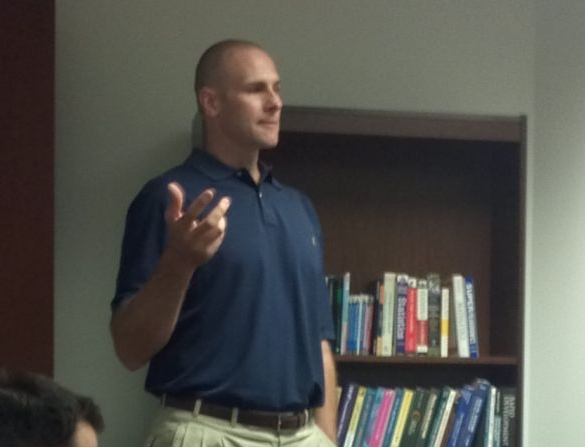There is No I in Startup
UNC Great Eric Montross Dishes Startup Advice

|
BY JOE PROCOPIO •
@jproco •
5.24.12
| |||||||||||||||||
Filed Under: NEWS: Startups
 I'm constantly blown away by the parallels between sports and startups. And not just the obvious lexicon similarities like "win", "game-changer", "home run", "swinging for the fences", "layup", "slam dunk" and on and on (and on, this is my thing).
I'm constantly blown away by the parallels between sports and startups. And not just the obvious lexicon similarities like "win", "game-changer", "home run", "swinging for the fences", "layup", "slam dunk" and on and on (and on, this is my thing). I'm talking about the actual lifecycle of the team, from the first time they come together to the end of a championship run. From founding to exit event (pun intended), succeeding with a startup is exactly like succeeding in sports.
So it made perfect sense for Robbie Allen to bring in Eric Montross for Automated Insights' quarterly meeting. Even more perfect since AI was born from and still operates the StatSheet Network. Here's some of what we learned during the gracious hour-plus he spent with us talking teamwork and learning from great leaders like Dean Smith and great teammates like George Lynch.
Oh, and it should be noted that I'm an NCSU Engineering alumnus. I'm working on Robbie to bring in Corch and Rodney in August.
The Team is the Most Important Thing
Anyone who has succeeded in any fashion in the startup world will tell you that the three more important aspects of startup success are Team, Luck, and Team.
Montross talked about how the 1993 championship team came together and worked hard every time they hit the floor, whether it was conditioning drills, practice, or the game.
They all kept a photo of the scoreboard from the Superdome where that season's Final Four would be played with the words "North Carolina Tarheels: 1993 National Champions" superimposed on it in their lockers and looked at it every day. That's all they thought about.
Everyone Must be Bought In
That goes without saying, but it's not just a saying. Fostering and maintaining passion is the not just the work of the coach or any specific team leader, it's everyone's job.
From the moment he joined the program, he learned the team rules not from the coaches or the assistants, but from the other guys on the team, and not always by what they said, but usually by what they did.
The true leaders, Montross said, were the ones who led by example -- George Lynch setting screens and taking charges, the whole team adopting "point to the passer" where the scorer immediately points out the teammate who got him the ball.
These things are crucial.
Only a Tight Team Will Survive
I asked how he or Dean or the other leaders on the team dealt with long, grueling seasons, failure, and the inevitable lapses in passion that come with working long, consecutive days and not seeing much immediate progress.
He had a great answer. Nobody gets chewed out, nobody gets a phony pep talk, but a true tight team will recognize those down days, slumps, and mistakes, and know the player well enough to be able to do and say the right things to "get them off the bumpers and back on track."
Admit it, own it, and move on.
And then of course, when Montross had left, after making sure he had met and had a chance to talk to everyone, we all went back to work, determined more than ever to hit that next home run, get that next slam dunk, and create a real game-changer.
Companies We Mentioned In This Post
|
|
You Might Also Be Interested In
 A Rant Against Bad Startup Advice
A Rant Against Bad Startup AdviceEvery so often, I find myself at odds with a particular bit of conventional startup advice.
The Open Interconnect Consortium, a group of big tech companies including Intel, Samsung, and Dell, announced this week their intention to create and open-source a specification for connecting the billions of things that make up the Internet of Things.
 Time To Shelve the Turing Test
Time To Shelve the Turing TestSo the Internet collectively lost its mind last week on the story that machines had finally caught up to us cagey humans, and that a supercomputer called Eugene Goostman effectively passed the age-old Turing Test
 It's Tough To Be an Angel (Investor)
It's Tough To Be an Angel (Investor)A very odd thing happened at the ExitEvent Startup Social this past Monday night at Boylan Bridge Brewpub in downtown Raleigh.
 Why (Good) Journalists Have Nothing to Fear from Automated Content
Why (Good) Journalists Have Nothing to Fear from Automated ContentOn Friday, May 30th, I'll be speaking at the Tow Center for Digital Journalism at Columbia University at the Quantifying Journalism: Metrics, Data and Computation Conference. I'll be talking about the Robot Reporter trend.